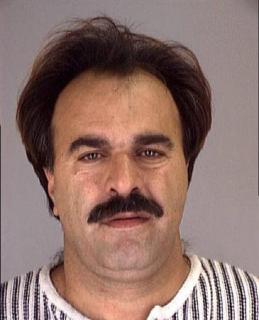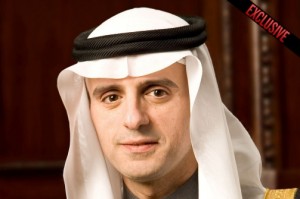By Alistair Lyon
LONDON | Wed Oct 12, 2011 2:31pm EDT
(Reuters) – You couldn’t make it up — or could you?
U.S. allegations that an Iranian spy outfit attempted to kill the Saudi ambassador in Washington in a convoluted plot involving a U.S. informant posing as a member of a Mexican drug cartel seem bizarre to say the least.
Still, Washington says the drama justifies new international sanctions against Iran and Saudi Arabia’s former intelligence chief insists that “somebody in Iran” must pay the price.
“The burden of proof and the amount of evidence in the case is overwhelming and clearly shows official Iranian responsibility for this,” Saudi Prince Turki al-Faisal said.

Manssor Arbabsiar is shown in this 1996 Nueces County, Texas, Sheriff's Office photograph released to Reuters on October 12, 2011. Arbabsiar, 56, who is a naturalized U.S. citizen and holds an Iranian passport, was arrested at John F. Kennedy International Airport in New York on Sept. 29. The United States accused Iran on Tuesday of backing a plot to kill the Saudi ambassador to Washington, escalating tensions with Tehran and stirring up a hornet's nest in the Gulf, where Saudi Arabia and Iran have long jostled for power. Iran denied the charges and expressed outrage at the accusations. REUTERS/Nueces County Sheriff's Office/Handout
The potential consequences are dire in a tense region where the United States and Israel reserve the right to attack Iran to stop it acquiring a nuclear bomb, a goal Tehran disavows.
For starters, the row could throttle any slim chance of resuming negotiations to settle the nuclear dispute.
Saudi-Iranian acrimony has ratcheted up this year, especially since Saudi troops intervened to help Bahrain’s Sunni rulers crush protests led by the island’s Shi’ite majority and fomented, according to Saudi Arabia and Bahrain, by Iran.
From across the Middle East’s Arab-Persian and Sunni-Shi’ite faultlines, Riyadh also accuses Tehran of inciting unrest among minority Shi’ites in its own oil-rich Eastern Province, and has often urged the United States in the past to attack Iran, according to diplomatic cables published by WikiLeaks.
The plot suspects are Iranian-American Manssor Arbabsiar, 56, arrested on September 29 in New York, and Gholam Shakuri, said to be a member of Quds Force, the covert, operational arm of Iran’s Revolutionary Guards. He is thought to be in Iran.
U.S. evidence rests mainly on Arbabsiar’s alleged confession that he had acted for men he thought were top Quds officials.
MOTIVE AND MEANS
Yet questions abound over the putative plot, not least the classic ones of motive and means. Many analysts are skeptical.
What could Iran hope to gain from an assassination that would have brought fierce retribution? Why try to recruit a hitman from a Mexican drug cartel instead of using its own?
On the other hand, why would the United States, even with a presidential election looming next year, go public with such accusations unless they were well founded, knowing the impact they could have on an already volatile Middle East?
“Killing the Saudi envoy in America has no benefit for Iran,” said independent Iranian analyst Saeed Leylaz. “Why should Iran create hostility when the region is boiling?
Dismissing the “very amateur scenario” as out of character, he said: “Iran might have conducted some political adventurism like denying the Holocaust, but an assassination attempt, particularly in America, is so un-Iranian.”
It would certainly be a departure for Iran, although it has assassinated its own dissidents abroad since the 1979 Islamic revolution, and it has used Hezbollah guerrillas in Lebanon and Shi’ite militias in Iraq to further its own aims.
Decision-making in Tehran is murky and factional rivalry is rife. But the idea that rogue Quds elements could concoct such a momentous plot seems a stretch. That Supreme Leader Ayatollah Ali Khamenei would authorize it seems more so.
“The United States would not blame the IRGC (Iranian Revolutionary Guard Corps) without substantial evidence,” argued U.S.-based global intelligence company Stratfor.
“However, this plot seems far-fetched considering the Iranian intelligence services’ usual methods of operation and the fact that its ramifications would involved substantial political risk,” it added.
Former CIA agent Robert Baer poured scorn on the reported Iranian conspiracy. “This stinks to holy hell,” he told Britain’s Guardian newspaper. “The Quds Force are very good. They don’t sit down with people they don’t know and make a plot. They use proxies and they are professional about it.”
CONSEQUENCES UNCLEAR
How this lurid episode in the adversarial relationships between Iran, the United States and its Saudi ally will play out in a Middle East already in turmoil is not yet clear.
Iran’s parliamentary speaker, Ali Larijani, said the “fabricated allegations” were a U.S. bid to divert attention from Arab uprisings that Iran says were inspired by its own Islamic revolution which toppled the U.S.-backed Shah in 1979.
Tehran has watched in glee as popular revolts have ousted U.S. allies in Egypt and Tunisia, even if Islam has not been the overt driving force behind the surge of Arab unrest – it may have more in common with Iran’s own street protests against President Mahmoud Ahmadinejad’s disputed re-election in 2009.
Iran, however, is disconcerted by the upheaval in Syria, its only solid Arab ally and overland link to Hezbollah.
The fall of President Bashar al-Assad would damage Iran’s “resistance” axis and perhaps strengthen Saudi Arabia and Turkey, its main Sunni rivals for influence in the Middle East.
Major General Qasem Soleimani, the head of the Quds Force, is already on a U.S. sanctions list for allegedly supporting Assad’s violent six-month-old crackdown on dissent.
Nevertheless, it seems doubtful that any of the protagonists would want to use the alleged Iranian plot as a pretext for all-out confrontation in a region the world depends on for oil.
Given that no one was hurt, Iran, the United States and Saudi Arabia may avert any violent fallout — although Washington clearly intends to push for further international punishment of Iran for its defiance of U.S. policy.
“More U.S. sanctions will be about the limit of it,” said Alastair Newton, a former senior British Foreign Office official and now senior political analyst for Japanese bank Nomura. “The U.S. case hardly looks solid, either, so let’s wait and see.”
U.S. officials have themselves acknowledged that the details of the plot smack of a Hollywood script, with Secretary of State Hillary Clinton jesting: “Nobody could make that up, right?”
(Additional reporting by Parisa Hafezi in Tehran, Peter Apps and Dmitry Zhdannikov in London, and Washington/New York bureaux; Editing by Alastair Macdonald)






I blog often and I seriously thank you for your information. This great article
has really peaked my interest. I’m going to take a note of your blog and keep checking for new information about
once a week. I subscribed to your Feed too.